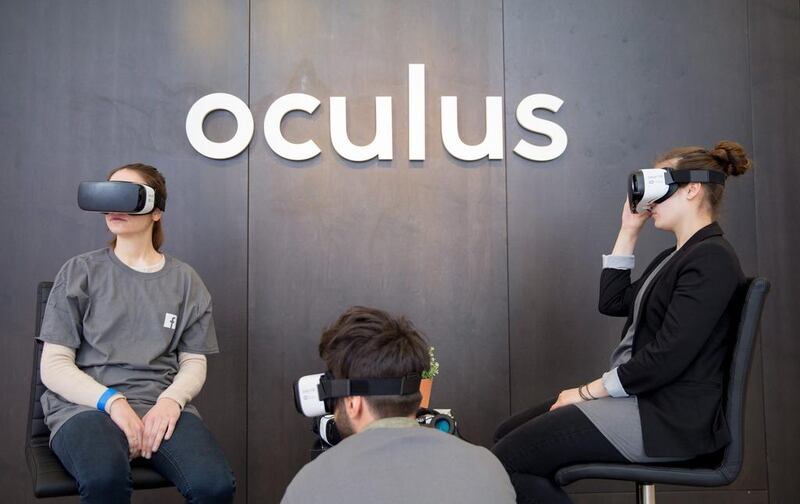The Facebook chief executive Mark Zuckerberg has vehemently denied court claims that the virtual-reality headset maker acquired by his company in 2014 had stolen technology for the Oculus Rift virtual reality device.
The online juggernaut’s co-founder, who has hailed virtual reality as his company’s next big thing, was called to the witness stand in Texas on Tuesday by ZeniMax Media, which alleges that Oculus VR poached one of its star designers and purloined its intellectual property. The US$2 billion trial in Dallas federal court is in its second week.
“I am aware of the claims,” Mr Zuckerberg told jurors, in what he said was his first testimony given in a trial. “I’m here because I believe they’re false and it’s important to testify to that.”
ZeniMax has accused Facebook of completing its acquisition of Oculus in July 2014 with “full awareness” that the crucial know-how behind one of Silicon Valley’s most promising consumer devices was misappropriated.
“I’ve asked our team to look into this,” Mr Zuckerberg said. “We have. Our conclusion is the claims are wrong.”
If ZeniMax is successful at the trial, it would rewrite the story of how Facebook emerged at the forefront of the virtual-reality boom, with Microsoft, Sony, Alphabet’s Google and others competing for a piece of a market that’s forecast to exceed US$84 billion in sales in 2020.
Mr Zuckerberg testified that an email from the venture capitalist and long-time Facebook board member Marc Andreessen was the seed of his interest in Oculus.
Mr Andreessen wrote that the Oculus headset “blew my brain wide open” and that the key to the company was the hiring of John Carmack, who became Oculus’ chief technology officer in August 2013. “I just wanted to give him all my money on the spot,” Mr Andreessen said in the e-mail.
“He’s excited,” Mr Zuckerberg testified.
Mr Carmack, a creator of the blockbuster video games Doom and Quake, worked for ZeniMax before he joined Oculus. ZeniMax claims Mr Carmack was responsible for much of the critical early development of the software and hardware for the virtual-reality headset before he was recruited away.
He acknowledged in testimony last week that he copied computer files containing work he did at ZeniMax when he left the company. But he denied using the material in his work for Oculus and credited the Oculus founder Palmer Luckey, a young hobbyist, with developing an “elegantly simple” prototype with a wide field of view that evolved into the Oculus Rift, which began shipping in March for $599. Mr Luckey, another defendant in the lawsuit, has not testified yet.
Mr Zuckerberg said that three days after meeting Carmack in March 2014, he set out a timeline for a quick purchase of Oculus.
ZeniMax’s lawyer, Tony Sammi, tried to get Mr Zuckerberg to confirm the announcement of the acquisition was delayed a day because Mr Carmack – who stood to make $100 million in the deal – was concerned he might be sued by ZeniMax over his work for the company on virtual reality. The judge overseeing the trial has ruled that an indemnity agreement protecting Mr Carmack would not be allowed into evidence because it might prejudice the jury.
Mr Zuckerberg responded that he did not know the details of Mr Carmack’s concerns. He said the day-long delay came as a result of indecision at Facebook.
“We were having a lot of conversations internally on our side whether this was the right thing to go forward and do,” Mr Zuckerberg testified. “Everyone will admit $2bn is a lot of investment.”
Mr Sammi told the jury in his opening argument last week that ZeniMax put Facebook on notice that it was “buying stolen goods” and displayed a photo of Mr Zuckerberg in front of a screen depicting Facebook’s old motto, “Move Fast And Break Things”.
But Mr Zuckerberg said Tuesday he had never heard of ZeniMax before it sued Oculus in May 2014. He said it is common for companies to “come out of the woodwork” and make claims following an acquisition.
* Bloomberg





